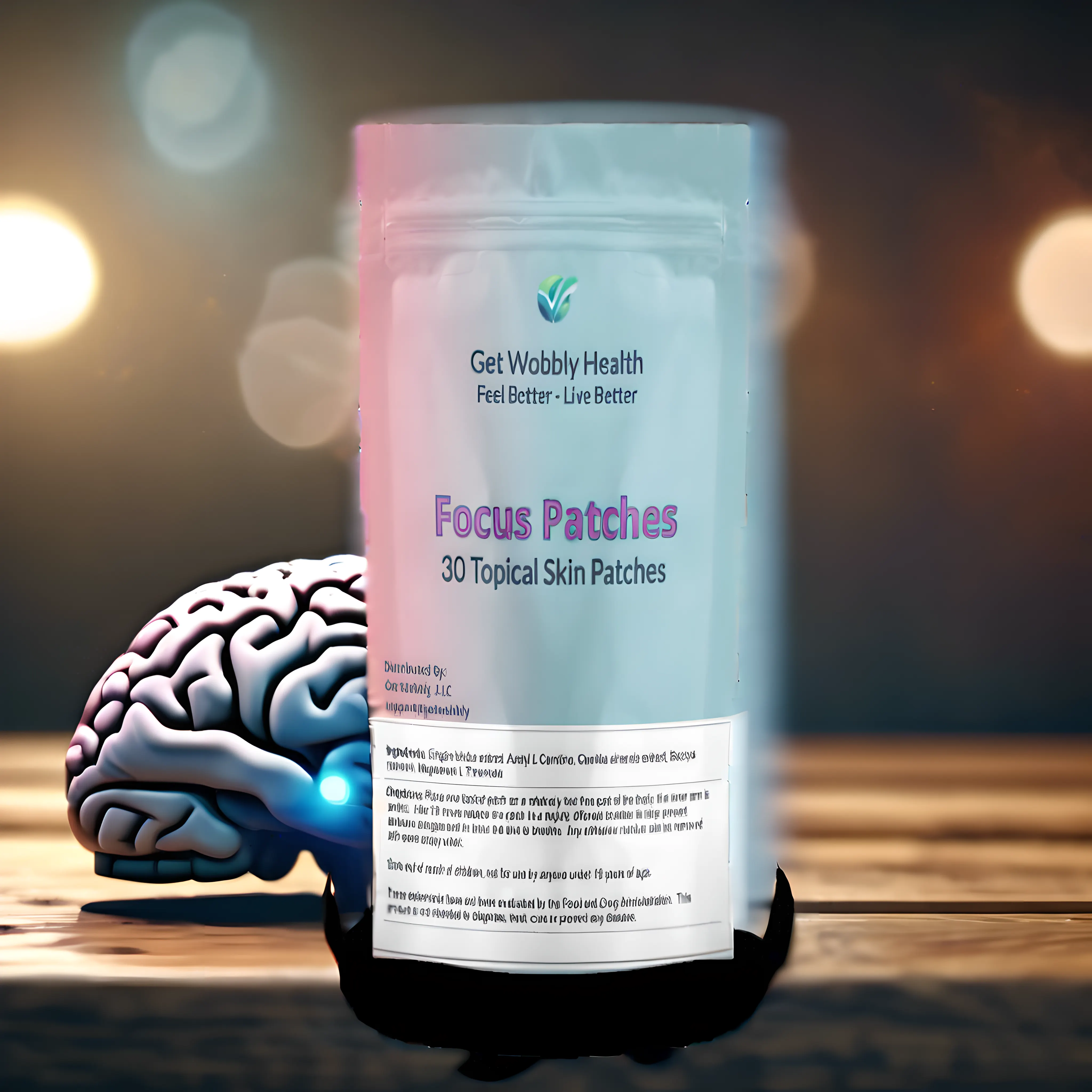Can Omega-3 Fatty Acids Improve Brain Health And Cognitive Decline?

Can Omega-3 Fatty Acids Improve Brain Health And Cognitive Decline?
Cognitive function and brain health are vital aspects of our overall well-being. The question on everyone's mind is this: Can omega-3 fatty acids truly make a difference in improving brain health and combating cognitive decline? Let's look into the science behind these powerful nutrients and how they impact our mental acuity and brain function.
Key Takeaways:
- Omega-3 Fatty Acids Benefits: Omega-3 fatty acids can potentially improve brain health and cognitive decline by reducing inflammation and supporting brain cell function.
- Source of Omega-3: These fatty acids are commonly found in fatty fish like salmon, mackerel, and sardines, as well as in walnuts, chia seeds, and flaxseeds.
- Research Evidence: Studies suggest that Omega-3 fatty acids may help slow cognitive decline and reduce the risk of dementia and Alzheimer's disease.
- Additional Benefits: Apart from brain health, Omega-3 fatty acids also offer benefits for heart health, reducing inflammation, and supporting overall well-being.
- Consult a Healthcare Provider: Before starting any new supplement regimen, it's important to consult with a healthcare provider to determine the appropriate dosage and ensure it is safe for your individual health needs.
The Omega-3 Family: An Overview
EPA, DHA, and ALA: Meet the Gang
Omega-3 fatty acids are the superheroes of the nutrient world. These powerful nutrients come in three main forms: eicosapentaenoic acid (EPA), docosahexaenoic acid (DHA), and alpha-linolenic acid (ALA). EPA and DHA primarily come from marine sources like fatty fish and algae, while ALA is commonly found in plant-based sources like flaxseeds, chia seeds, and walnuts.
These fatty acids play vital roles in brain health, cardiovascular function, and inflammatory responses. EPA and DHA are known for their ability to reduce inflammation in the body and support proper brain function. On the other hand, ALA is important as it is converted into EPA and DHA in small amounts in the body.
Sourcing Omega-3s: Marine vs. Plant-Based Options
Omega-3s can be sourced from both marine and plant-based options, each offering unique benefits. Marine sources like fatty fish and algae provide rich amounts of EPA and DHA, which are crucial for optimal brain function and cognitive health. On the other hand, plant-based sources such as flaxseeds, chia seeds, and walnuts offer ALA, which can be converted into EPA and DHA in the body.
It's important to note that while marine sources offer direct forms of EPA and DHA, plant-based sources provide important ALA, which can still contribute to the body's omega-3 levels. If you follow a plant-based diet or have dietary restrictions that limit marine sources, incorporating a variety of plant-based omega-3s can still support your brain health and overall well-being.

The Brain-Omega Connection
Even as research in the field of nutrition and brain health continues to evolve, Omega-3 fatty acids have emerged as key players in maintaining optimal cognitive function and potentially preventing cognitive decline. These crucial fatty acids play a crucial role in various aspects of brain health, from building and maintaining brain structure to facilitating communication between brain cells.
Building Blocks: Omega-3s and Brain Structure
The Omega-3 fatty acids EPA (eicosapentaenoic acid) and DHA (docosahexaenoic acid) are particularly abundant in the brain, where they play a vital role in maintaining the structure and function of brain cell membranes. DHA, in particular, is highly concentrated in neuronal membranes and is crucial for proper signal transmission between brain cells.
The brain's gray matter, which is responsible for processing information, also contains significant levels of DHA. By incorporating Omega-3 fatty acids into our diet, we are providing our brains with the necessary building blocks to maintain optimal structure and function, potentially supporting overall cognitive health as we age.
Signaling and Function: How Fatty Acids Facilitate Communication
The role of Omega-3 fatty acids in brain health goes beyond structural support. These crucial fats also play a crucial role in facilitating communication between brain cells. EPA and DHA are involved in the production of signaling molecules called eicosanoids, which help regulate inflammation, blood flow, and neural signaling in the brain.
Optimal levels of Omega-3 fatty acids have been associated with improved cognitive function, mood regulation, and even a reduced risk of neurodegenerative diseases. By supporting healthy communication between brain cells, these fatty acids may help maintain optimal brain function and cognitive abilities throughout life.
Any imbalance in Omega-3 levels can disrupt the intricate communication network within the brain, potentially leading to cognitive decline and increased risk of cognitive disorders. It is crucial to consume sufficient amounts of these crucial fatty acids through diet or supplementation to support brain health and overall cognitive function.
Communication between brain cells is complex and crucial for maintaining optimal cognitive function. By including Omega-3 fatty acids in your diet, you are providing your brain with the necessary tools to support healthy communication pathways and potentially safeguard against cognitive decline. Taking care of your brain health now can have long-lasting benefits for your cognitive function and overall well-being.
Omega-3s and Cognitive Decline: The Evidence
Piercing Through the Myths: What Science Says
The myth that omega-3 fatty acids have no impact on cognitive decline is simply that - a myth. Science has shown time and time again the positive effects that omega-3s can have on brain health and cognitive function. Research has demonstrated that omega-3 fatty acids are crucial for brain development and function throughout all stages of life, from early childhood to old age.
Studies have consistently linked higher omega-3 levels in the blood with better cognitive function, including improvements in memory, processing speed, and overall brain health. The evidence is clear - omega-3 fatty acids play a vital role in maintaining and enhancing cognitive abilities as we age.
The Aging Brain: Can Omega-3s Slow Cognitive Deterioration?
The aging brain is susceptible to cognitive decline, but can omega-3 fatty acids help slow this deterioration? Research suggests that omega-3s may indeed benefit cognitive function in older adults. Some studies have indicated that regular consumption of omega-3-rich foods or supplements can potentially reduce the risk of cognitive decline, such as memory loss and decreased cognitive abilities.
Piercing through the noise around brain health and omega-3s reveals a promising link between these imperative fatty acids and cognitive function in later years. While more research is needed to fully understand the mechanisms at play, the potential benefits of omega-3s for the aging brain are too significant to ignore.
Boosting Brain Health Across All Ages
Early Development: Omega-3s in Childhood and Adolescence
Keep those young minds sharp and ready for learning by incorporating Omega-3 fatty acids into their diets during childhood and adolescence. Studies have shown that Omega-3s play a crucial role in brain development, helping to improve cognitive function, memory, and attention span in children and teens.
Across the board, including sources of Omega-3s such as fatty fish, walnuts, and flaxseeds can make a significant impact on brain health during these formative years. Whether it's adding a serving of salmon to their weekly meals or incorporating a daily fish oil supplement, the benefits of Omega-3s for young brains are undeniable.
Vitality in Midlife: Keeping the Cognitive Engines Oiled
An important part of maintaining cognitive function as we age is ensuring that our brains are well-nourished with Omega-3 fatty acids. Incorporating foods rich in Omega-3s into our diets, such as avocado, chia seeds, and olive oil, can help support brain health and potentially reduce the risk of cognitive decline in midlife.
Omega-3s have been linked to improved memory, focus, and overall brain function, making them a crucial component of a healthy diet for adults looking to protect their cognitive abilities as they age. Consider adding a daily Omega-3 supplement or incorporating Omega-3-rich foods into your meals to keep your cognitive engines running smoothly.
An imbalance of Omega-3 and Omega-6 fatty acids in the diet can contribute to inflammation in the brain, which has been linked to cognitive decline and neurological disorders. It's important to focus on maintaining a healthy balance of these important fatty acids to support optimal brain function and overall cognitive health.
Potential Sidekicks: Complementary Nutrients and Habits
Nutritional Allies: Synergistic Effects with Omega-3s
Now, let's talk about the dream team of nutrients that can supercharge the benefits of Omega-3 fatty acids. Omega-3s work in synergy with certain other nutrients to enhance their cognitive-boosting effects. For instance, studies have shown that combining Omega-3s with vitamin D can have a powerful impact on brain health. This dynamic duo not only supports cognitive function but also helps in reducing the risk of cognitive decline.
With the right combination of nutrients, you can create a powerful brain-boosting cocktail that fuels your mind for optimal performance. Ingredients like magnesium, zinc, and antioxidants can further enhance the effects of Omega-3 fatty acids, promoting overall cognitive well-being and mental sharpness.
Brain-Boosting Behaviors: Lifestyle Factors in Cognitive Enhancement
Now, let's look into the lifestyle factors that can turbocharge your cognitive abilities. Exercise, adequate sleep, and stress management play a crucial role in supporting brain health and cognitive function. Engaging in regular physical activity can boost blood flow to the brain, improving memory, focus, and overall cognitive performance.
Adopting brain-boosting habits like meditation and mindfulness can help in reducing stress levels and enhancing mental clarity. Healthy social interactions and engaging in stimulating activities can also contribute to cognitive resilience and brain health.
- Exercise: Regular physical activity can improve brain health and cognitive function.
- Sleep: Adequate rest is crucial for memory consolidation and cognitive performance.
- Stress Management: Chronic stress can negatively impact brain health and cognitive function, so finding healthy ways to manage stress is crucial.
Lifestyle choices have a profound impact on brain health and cognitive function. By incorporating brain-boosting habits and nourishing your body with the right nutrients, you can unlock your cognitive potential and optimize your mental performance. Perceiving your brain as a muscle that needs regular exercise and nourishment is the first step towards achieving optimal cognitive health.
Beyond the Hype: Risks and Considerations
When Good Fats Go Bad: Potential Drawbacks of Omega-3s
To separate fact from fiction when it comes to Omega-3 fatty acids, we must acknowledge that while they offer numerous benefits, there are also potential drawbacks to consider. With all the buzz around Omega-3s, it's easy to overlook the risks associated with high doses. Excessive intake of Omega-3 supplements can actually increase the risk of bleeding, especially for those already taking blood-thinning medications.
Another important point to note is that Omega-3 supplements are not regulated by the FDA in the same way that prescription medications are. This lack of regulation means that the quality and purity of these supplements can vary greatly between brands, leading to potential health risks if you are not careful about the product you choose.
Personalized Assessment: Who Really Needs Omega-3 Supplements?
To truly reap the benefits of Omega-3 fatty acids, it's crucial to understand that not everyone may need to take supplements. On an individual level, factors such as diet, lifestyle, and existing health conditions can significantly impact the need for supplementation. For example, individuals who consume a diet rich in fatty fish like salmon may already be meeting their Omega-3 needs through food alone.
Really entering into personal health factors with a healthcare professional can help determine if supplementation is necessary. Factors such as age, dietary habits, and medical history all play a role in identifying who can benefit the most from Omega-3 supplements. It's crucial to assess your individual needs before jumping on the Omega-3 bandwagon.

Summing up
Presently, the research surrounding omega-3 fatty acids and their potential benefits for brain health and cognitive decline is promising but inconclusive. While some studies suggest a positive impact on cognitive function and a potential role in preserving brain health, more research is needed to fully understand the extent of these benefits.
It's clear that omega-3s play a vital role in overall health, and incorporating them into your diet through foods like fish, walnuts, and flaxseeds can contribute to a well-rounded nutrition plan. For a detailed look at how omega-3s affect brain health, check out this feature on Omega-3s and brain health.
FAQ
Q: Can Omega-3 Fatty Acids Improve Brain Health And Cognitive Decline?
A: Absolutely! Omega-3 fatty acids are known to support brain health and cognitive function by reducing inflammation and promoting the growth of brain cells.
Q: What are some good food sources of Omega-3 fatty acids?
A: Great question! Some excellent food sources of Omega-3 fatty acids include fatty fish like salmon, sardines, and mackerel, as well as flaxseeds, chia seeds, and walnuts.
Q: How much Omega-3 should I consume daily for brain health?
A: It is recommended to consume at least 250-500 milligrams of combined EPA and DHA Omega-3 fatty acids per day to support brain health and cognitive function.
Q: Are there any supplements available for Omega-3 fatty acids?
A: Yes, there are many Omega-3 supplements available in the market that can provide you with the necessary EPA and DHA for brain health. Make sure to choose a high-quality supplement from a reputable brand.
Q: Can Omega-3 fatty acids help with memory and concentration?
A: Absolutely! Omega-3 fatty acids have been shown to improve memory, focus, and concentration, making them a valuable nutrient for overall brain health and cognitive function.
Elevate your mental clarity and concentration with our innovative brain focus patches, offering you the unfair advantage to unlock your brain's full potential amidst the challenges of modern life and nutrition deficiencies. << Click Here >>

